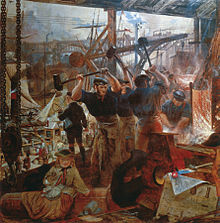William Bell Scott
He was also a poet and art teacher, and his posthumously published reminiscences give a chatty and often vivid picture of life in the circle of the Pre-Raphaelites; he was especially close to Dante Gabriel Rossetti.
After growing up in Edinburgh, he moved to London, and from 1843 to 1864 was principal of the government School of Art in Newcastle upon Tyne, where he added industrial subjects to his repertoire of landscapes and history painting.
[4] He resigned his appointment under the Science and Art Department in 1885, and from then until his death he was mainly occupied in writing his reminiscences, Autobiographical Notes, which were published posthumously in 1892, with a memoir by Professor Minto.
[3] Scott's poetry, which he published at intervals (notably Poems, 1875, illustrated by etchings by himself and Alma-Tadema), recalled William Blake and Percy Bysshe Shelley, and was considerably influenced by Rossetti.
He also wrote artistic and literary criticism, and edited John Keats, Letitia Elizabeth Landon, Lord Byron, Samuel Taylor Coleridge, Shelley, William Shakespeare and Sir Walter Scott.
Although unhappily married, Bell Scott refused to cause a scandal by leaving his wife, and a workable ménage à trois was established: Alice spent winters with William and Letitia in London, while they came to Penkill in the summers.




